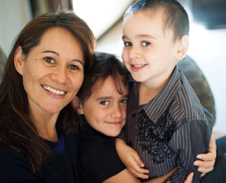What we do
 Our focus is on the continuum of health and wellness, from reproductive health to pregnancy and childbirth to infant and child health.
Our focus is on the continuum of health and wellness, from reproductive health to pregnancy and childbirth to infant and child health.
We bring together world-class researchers to work closely with community groups and policymakers to ensure the research we conduct is translated into policy changes and programme interventions that make a real difference in New Zealand women's lives and those of their families.
We aim to reduce inequalities and health care disparities for women and have a particular focus on Māori health. By focusing on those mothers and children with the greatest disadvantages we are more likely to find solutions to improve the health of all women and children.
To date, our work on sexual reproductive health has been reported on widely and has contributed to policy changes – not only in New Zealand, but worldwide. Our studies into the preventability of severe maternal morbidity, a world first, showed a dramatic need for improvement of care for pregnancy and childbirth.
Our ability to conduct qualitative research with young pregnant Māori (under 20) has created new knowledge about maternal care pathways, which contradicts commonly held views about Māori accessing delayed maternity care. In reality these young women seek health services early and face service barriers to accessing appropriate maternity care.
With your support, we can continue our life-changing work and make a real impact on the lives of the women and children of Aotearoa New Zealand – and beyond.
Our approach
We are working on projects with the greatest impact for women in New Zealand.
We focus on the system, patient and provider factors to identify the knowledge gaps so we can create a systemic long-term impact for all women in New Zealand. By working with organisations and individuals across the spectrum – from doctors and policymakers to community groups and iwi – we are engaging with women at a grassroots level.
Our particular research interests currently focus on maternal health (especially in Māori women), early childhood and reproductive health across fertility, contraception and menopause. We explore these health issues in an attempt to address what is facing women today.
Using both quantitative and qualitative data, including observational studies, interviews, data collection and analysis, and more, our studies involve rigorous research and have been published in countless medical and research journals worldwide. We also ensure our methodology fits within a Kaupapa Māori research paradigm that sees Māori as normal, avoids a victim-blaming mentality and promotes a structural analysis.
The methodologies employed within Kaupapa Māori research are collaborative and whānau-centered. This is carried through to our Department, where we work as a team unit to provide high-quality transformational research.